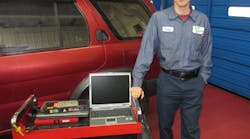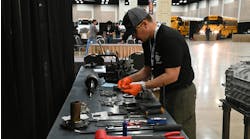I'm unlike most people in this business, because I didn't get into it by enjoying working on my cars as a teenager. My first car was a 1985 Chrysler LeBaron that I bought for $100. Sure, my father and I fixed it up, but he's an old-school Italian who was very critical of my work, so it just never left a good taste in my mouth. Now, fast forward ten years. I own a repair shop in Mahopac, NY. The business has grown on me a little since then, but I would not consider myself a "fan boy." I run my business not so much out of passion, but more as a pragmatist.
So, one thing I could never understand was how there is a clique of technicians and shop owners out there that have fun going out to training events. They make VISION or Showpower their vacation that year. The wife and kids get to go out and try to have fun somewhere in the Midwest while the man of the house gets to learn about 7.3L Powerstroke problems and VW torque converter lock-ups. I know one shop owner in particular who does not even work on the cars, but she flies out to every training event. What's the point?
Training is a necessary, because to work on today's vehicles you need to know so many things about how each manufacturer is different, how systems work, emissions issues, and etcetera. Just like buying tools is a necessary (we need them to fix cars), so is buying training—we need it to fix cars!
Cars are just getting increasingly technical these days. You need to know how to interpret air-fuel ratio sensors, understand electricity, diagnose CAN networks, and then some. I simply would not be able to take in the jobs that I do without training. If you refer everyone back to the dealer, they'll just assume you're not smart enough to work on the "new cars." So, the result is that the dealer or the garage that can take in the work will get the brake jobs and suspension that makes you the real money.
However, training costs a lot of time and money. Because I'd rather spend my spare time with my wife and money on anything else but work, I like to be smart about how I spend for training. Personally, I find that the best value comes from hands-on training.
Unlike most shop owners, I don't have to pay for a lot of my training simply because my father, G "Jerry" Truglia, is a president of a training not-for-profit called Technicians Service Training and he does his own hands-on classes. Fortunately, he teaches professionally much better than he taught me as a teenager working on my own LeBaron. That is not to say I have not spent good money on training, particularly WorldPac's, which costs hundreds of dollars per day.
Based on personal experience I have a lot of opinions concerning training: What I think of training DVDs, online training, hands-on training, and then some. Look forward to future blog posts about these topics.




